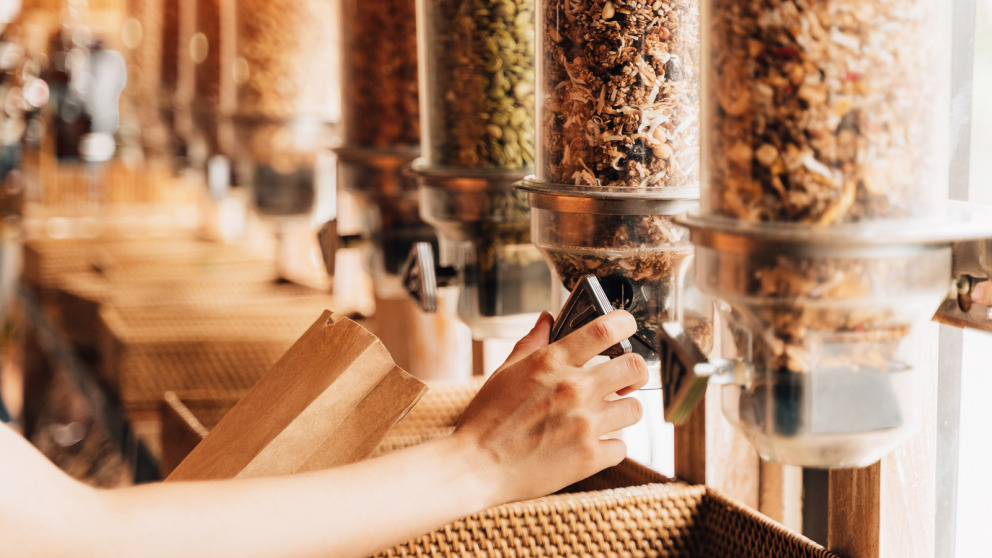Reducing Plastic Waste Will Require Fundamental Change in Culture
30.06.2021
Plastic waste is considered one of the biggest environmental problems of our time. IASS researchers surveyed consumers in Germany about their use of plastic packaging. Their research reveals that fundamental changes in infrastructures and lifestyles, as well as cultural and economic transformation processes, are needed to make zero-waste shopping the norm.

96 percent of the German population consider it important to reduce packaging waste. Nevertheless, the private end consumption of packaging in Germany has increased continuously since 2009. At 3.2 million tons in 2018, the amount of plastic packaging waste generated by end consumers in Germany has more than doubled since 1997. At 228 kilograms per capita, packaging consumption in Germany was significantly higher than the European average of 174 kilos per capita.
“Recycling only treats the symptoms of the plastic crisis and does not address the root cause, waste generation itself. We wanted to learn more about the barriers that prevent individuals in Germany from reducing their everyday consumption of plastic packaging for food and beverages. For our research project, a total of 40 participants contributed to discussions in four focus groups,” explains Jasmin Wiefek, lead author of the study. In their analysis of the discussions, the researchers identified twelve barriers to reducing plastic packaging consumption:
- Habits: The focus group participants mainly shop at supermarkets or discounters rather than markets or zero-waste shops. The discussion also revealed that most participants do not take their own bags or containers when they go grocery shopping. Processed and packaged foods are popular.
- Lack of knowledge: The researchers observed that participants were often uncertain which types of packaging are more sustainable than others.
- Hygiene: Discussions revealed that participants held reservations about the hygienic properties of freely accessible displays of unpacked goods, the use of self-brought packaging and long-term reusable packaging options in general.
- Material properties: Participants often preferred plastic packaging due to their material properties (e.g., lightweight, shatterproof, tear-resistant).
- Priorities: Several participants described how their efforts to use less plastic packaging clashed with other priorities in their daily lives. One example given was that parents do not want to pack heavy backpacks for their children and accordingly prefer to use plastic instead of glass bottles.
- Price: In general, groceries packaged in plastics are more affordable than plastic-free groceries.
- Availability: By default, most groceries offered in supermarkets and discounters are only available in plastic packaging and so participants feel that they have little choice.
- Diffusion of responsibility: According to the participants, both individuals and industry have a responsibility to solve the “plastic problem”: On the one hand, because industry is responsible for the fact that so many products are packaged in plastic, it must offer solutions. However, they also emphasised that consumers should shop more consciously and avoid products in plastic packaging.
- Reachability & infrastructure: Participants noted that places such as zero-waste shops or weekly markets were difficult to reach and required more time and effort to access than local supermarkets or discounters.
- Time and time structures: Time is another crucial barrier to plastic-free shopping. Due to the travel distances involved, accessing zero-waste shops and markets would take up more time for most people. Participants pointed out that shopping would also take longer if they filled the food in their own containers and that the containers would have to be cleaned subsequently. They also noted that preparing unprocessed foodstuffs takes more time.
- Convenience: Participants reported that they find it inconvenient to take their own containers to shops as it requires that they either carry the containers to work and back again or go out twice.
- Consumer Culture: The participants stated that they did not attach much importance to the availability of a ‘wide range of products’ when shopping. However, many stressed the importance of reliably finding specific products in shops. This translates into an indirect demand for a wide range of products, which is difficult for zero-waste / low-plastic retailers to implement. Discussions in the focus groups also showed that our culture of spontaneous and on-the-go consumption makes it difficult to reduce packaging. Many participants were unaware that non-regional and non-seasonal foods, which we consume as a matter of course every day, must be packaged to maintain their freshness during long distance transport.
“Our results show that at present a lot of effort and knowledge is required for consumers to avoid plastic packaging. If we want to make low-waste goods and goods without single-use plastic packaging the cheapest and most convenient option, we will need to change the relevant infrastructures, economic incentives, and political framework conditions,” explains project leader and co-author Katharina Beyerl. The goal of reducing the use of plastic packaging will not be achieved by merely asking consumers to shop exclusively in zero-waste stores. Instead, it requires fundamental changes in societal structures and lifestyles as well as a cultural shift.
Wiefek, J., Steinhorst, J., Beyerl, K. (2021 online): Personal and structural factors that influence individual plastic packaging consumption—Results from focus group discussions with German consumers. - Cleaner and responsible consumption, 3, 100022. https://doi.org/10.1016/j.clrc.2021.100022
Contact

